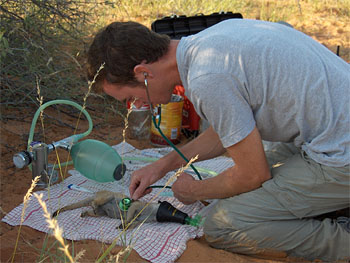Meerkats Hold The Key To Understanding TB - Simples!
 16 years ago
16 years ago  2795 views
2795 views
Posted
4th November, 2009 00h00
 Julian Drewe examining an anaethetised meerkat
In an article being published in the journal Proceedings of the Royal Society B today (Wednesday, November 4), Dr Julian Drewe reports that the transmission of this infectious disease is more strongly influenced by how contact is made, i.e. the type and direction of the contact; than among those animals that are the most socially interactive.
Until now, despite the global distribution of TB in free-living wild mammal populations, little has been known of the mechanisms of social transmission of Mycobacterium bovis between individuals.
Dr Drewe, who undertook the research while at the University of Cambridge, spent two years in the Kalahari Desert in South Africa recording the social lives of 250 wild meerkats. A sample of 110 meerkats in 5 social groups were tested for TB to see how their interactions with other meerkats caused the disease to spread.
The study found that meerkats catch TB by grooming friends and pass it onto enemies by biting them. A possible route for transmission between social groups was linked to male meerkats who were discovered to be at risk of infection when visiting neighbouring groups in search of females.
Dr Drewe comments: “This research helps us understand infectious disease transmission in humans and other species in which TB is a problem, such as badgers and cattle. The findings help us to identify which individuals in a large population are most at risk of infection. The aim now is to find ways to prevent these from infecting others, for example by vaccination.”
“Not many people realise that wild meerkats get TB. We were able to study their wide range of social interactions in incredible detail in order to gain a better understanding of this important disease,”
continues Dr Drewe. Meerkats live in close-knit social groups of up to 40 individuals. They co-operate in raising their young but may also be incredibly aggressive to intruders from other groups.
TB remains a huge problem in many countries. In the UK, testing cattle and compensating farmers for losses as a result of TB costs the British taxpayer over £100 million each year.
Julian Drewe examining an anaethetised meerkat
In an article being published in the journal Proceedings of the Royal Society B today (Wednesday, November 4), Dr Julian Drewe reports that the transmission of this infectious disease is more strongly influenced by how contact is made, i.e. the type and direction of the contact; than among those animals that are the most socially interactive.
Until now, despite the global distribution of TB in free-living wild mammal populations, little has been known of the mechanisms of social transmission of Mycobacterium bovis between individuals.
Dr Drewe, who undertook the research while at the University of Cambridge, spent two years in the Kalahari Desert in South Africa recording the social lives of 250 wild meerkats. A sample of 110 meerkats in 5 social groups were tested for TB to see how their interactions with other meerkats caused the disease to spread.
The study found that meerkats catch TB by grooming friends and pass it onto enemies by biting them. A possible route for transmission between social groups was linked to male meerkats who were discovered to be at risk of infection when visiting neighbouring groups in search of females.
Dr Drewe comments: “This research helps us understand infectious disease transmission in humans and other species in which TB is a problem, such as badgers and cattle. The findings help us to identify which individuals in a large population are most at risk of infection. The aim now is to find ways to prevent these from infecting others, for example by vaccination.”
“Not many people realise that wild meerkats get TB. We were able to study their wide range of social interactions in incredible detail in order to gain a better understanding of this important disease,”
continues Dr Drewe. Meerkats live in close-knit social groups of up to 40 individuals. They co-operate in raising their young but may also be incredibly aggressive to intruders from other groups.
TB remains a huge problem in many countries. In the UK, testing cattle and compensating farmers for losses as a result of TB costs the British taxpayer over £100 million each year.More from
- Animus launches SkinBond Multi for enhanced wound care
- IVC Evidensia reports 82% cut in Farm antibiotic use and 20% carbon emissions reduction
- Vet professionals flock to sign up to transformative locum platform
- The ProSalus Foundation launches urgent appeal for UK vets to support Ukrainian colleagues
- Vetsure Named Business of the Year at 2025 SME National Business Awards


 14 hours ago
14 hours ago